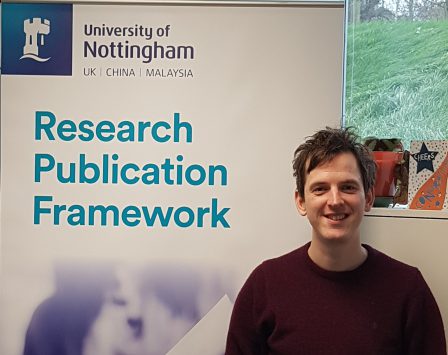
December 6, 2017, by Kate Snaith
Five minutes with… Ben Veasey
Name?
Ben Veasey
Job title?
Senior Research Librarian – Research Data Management for Libraries, Research and Learning Resources
So, what does that mean?
It just means that I am responsible for developing and delivering a research data management service in partnership with our brilliant colleagues in the Digital Research Team and Information Systems (IS).
Sounds interesting – Can you let us know a little bit more about what you do and how it can help supports the university’s research agenda?
Sure! The University has a really ambitious strategy around our digital research environment and research data management plays a key part in this. I am working with some fab people in order to make sure researchers have access to the services and support they require to manage their data – things like:
- help with regards to planning data management;
- access to storage technology suitable for holding sensitive material;
- support for publishing data so that others can see what great work we are doing at Nottingham;
- developing capabilities to preserve that data so that the researchers of the future will be able to build on the knowledge we are creating today.
Day to day this means that I’m involved in a lot of meetings talking about how we are going to achieve this, drafting operational policy and processes and developing guidance materials, in line with our research community’s requirements as well as public funder and publisher expectations.
Why does that matter?
So, I think research has an inverse problem and research data management can help to alleviate this.
What is an inverse problem?
It is a problem where we have the results but not the data – so it cannot be solved using direct measurements, perhaps because they are unobtainable. This is distinct from a forward problem, which is a problem that can be solved using direct measurements.
For example, imagine you receive 67% for a paper with the below marking scheme:
| Grade A | Grade B | Grade C |
| 50-59% | 60-69% | 70% and above |
You can easily work out your grade 67% = B. This is an example of a “forward problem”.
Now let’s imagine that all you get back on your essay is the grade ‘B’. You are unable to calculate exactly what score you received – you have no idea if you just scraped a ‘B’ or were one percentage point off an ‘A’. This is an inverse problem.
What does this look like to the University’s researchers?
In the research context this means often researchers can’t replicate studies by their peers (see this discussion in Nature from last year for more analysis) so conclusions drawn in those studies can’t be validated.
Why is this?
Often it is because the underlying data is not available to them. Scholarly outputs (such as journal articles) describe a study and present conclusions but often don’t contain the direct measurements, or direct information, that lead to the conclusions drawn – hence my reference to the inverse problem.
Research data management is about looking after the direct information, documenting it, preserving it and making it discoverable (and hopefully accessible, where possible) so that the scholarship can be validated and built upon. From that, we can all derive value.
What have been you recent highlights?
I recently got to help a researcher whose research data is some web pages. He wanted to be able to preserve these in order to mitigate against events such as the sites disappearing in the future. I got to have some fun in capturing these webpages so that they can be digitally preserved in our data repository.
Do you have any events or tips you would like everyone to know about?
I’m hoping to do some spotlight sessions in the new year so that folk in the library can come and hear more about research data management should it interest them. Watch this space.
Last question – If you could have super power; what would it be and why?
It’s got to be the ability to teleport anywhere hasn’t it? Imagine waking up on a Saturday in Beeston and ‘popping’ over to Petra for the afternoon. Either that or the power to stop my cat waking me up at 3am every single morning – it’s cute the first few times…
How can we get in touch for more information about RDM?
You can email me at benjamin.veasey@nottingham.ac.uk if you have any questions!
Thanks so much for talking to us Ben!
No comments yet, fill out a comment to be the first

Leave a Reply